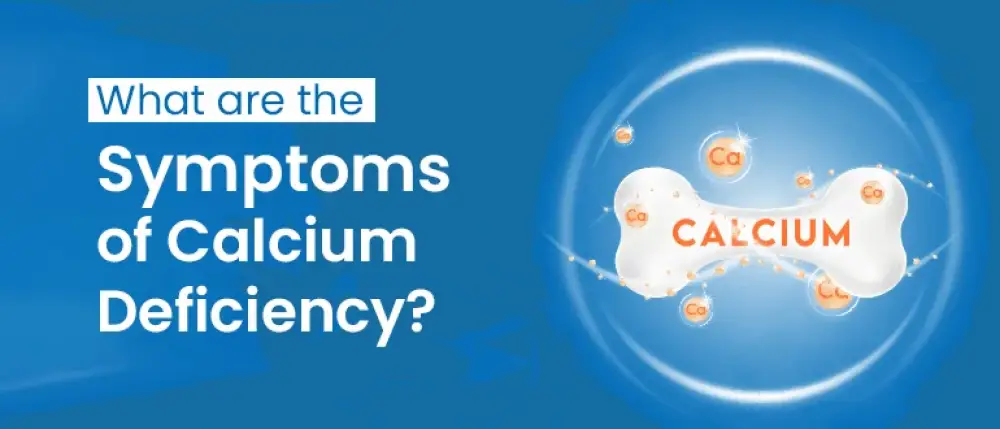Subscribe to get weekly insights
Always stay up to date with our newest articles sent direct to your inbox
Published on 30 Jul, 2024
Updated on 14 Mar, 2025
25474 Views
6 min Read

Written by Riya Lohia
6Likes
Anjali, a 25-year-old, was confused about why her nails weakened and bittered and her hair breakage was also bothering her. She decided to check with a healthcare professional and found out that she had calcium deficiency, which weakened her nails and hair. Her doctor prescribed her some calcium supplements and asked her to have calcium calcium-rich diet. Anjali went home and researched calcium deficiency more. She further delved into the symptoms of calcium deficiency, its causes, related diseases, and effective management strategies to help her understand and address this common issue.
Initially, she found out, calcium is a mineral that plays a critical role in various bodily functions. From building and maintaining strong bones and teeth to supporting nerve function and muscle contraction, calcium is indispensable for overall health. Despite its importance, many people experience calcium deficiency, which can lead to a range of health problems like Anjali was experiencing.
Anjali further read that calcium deficiency occurs when your body lacks sufficient calcium to perform its essential functions. This deficiency can affect bones, muscles, nerves, and the cardiovascular system. Calcium deficiency syndrome, often characterized by symptoms like muscle cramps, brittle bones, and fatigue, highlights the importance of maintaining adequate calcium levels. The human body stores 99% of its calcium in the bones and teeth, with only 1% present in the bloodstream and other tissues. This small percentage is crucial for vital functions, so even slight deficiencies can have significant impacts.
Anjali was curious about what causes calcium deficiency and found out that it can result from a variety of factors:
She understood that these causes help in addressing the root of the problem and implementing effective treatment strategies.
Anjali read that calcium deficiency symptoms can vary depending on the severity of the deficiency and the duration of its existence. Common symptoms include:
Anjali learned about a few calcium deficiency diseases and disorders:
Osteoporosis is a bone disease characterized by decreased bone density and increased fracture risk. It affects millions worldwide, particularly postmenopausal women and older adults. According to the International Osteoporosis Foundation, around 1 in 3 women and 1 in 5 men over the age of 50 will experience osteoporotic fractures. Calcium deficiency plays a significant role in the development of osteoporosis. Ensuring adequate calcium intake through diet or supplements is crucial in preventing and managing this condition.
Rickets is a condition that results in weakened and softened bones in children. It is often due to insufficient calcium and vitamin D, leading to deformities such as bowed legs and delayed growth. The World Health Organization (WHO) has reported a decline in rickets cases globally, but it remains a concern in areas with limited access to calcium-rich foods and sunlight.
Osteomalacia, the adult equivalent of rickets, results from a softening of the bones due to calcium or vitamin D deficiency. Symptoms include bone pain, muscle weakness, and difficulty walking. Osteomalacia is less common but can have serious implications for mobility and overall health.
Diagnosing calcium deficiency involves several steps:
Anjali also read about ways she can treat calcium deficiency:
For severe cases of calcium deficiency or related conditions, medical interventions may be necessary. This can include prescription medications such as bisphosphonates for osteoporosis or hormone replacement therapy for postmenopausal women. Always seek medical advice to tailor treatment to your specific needs.
Anjali also learned about the health insurance policy of Care Health Insurance which provides the benefit of four gynaecologist consultations per year. (For further details, kindly check our Care Supreme plan.)
Here are a few tips that can help prevent calcium deficiency:
Ultimately, Anjali realised that calcium is essential for maintaining healthy bones, teeth, and overall bodily functions. Calcium deficiency can lead to a variety of symptoms, from muscle cramps and brittle nails to serious conditions like osteoporosis and rickets. By understanding the causes, symptoms, and treatment options for calcium deficiency, you can take proactive steps to maintain optimal calcium levels and overall health. If you suspect you have a calcium deficiency or are experiencing related symptoms, consult a healthcare provider for diagnosis and personalized treatment.
>> Also Read: Tips to Deal with Vitamin C Deficiency
Disclaimer: Kindly consult a professional medical expert to verify the details of your health concerns. Also, verifying the policy details and coverage with the official policy documents is essential.
शुगर कंट्रोल कैसे करे? जानें, डायबिटीज में क्या खाना चाहिए Care Health Insurance in Health & Wellness
Thyroid : मामूली नहीं हैं महिलाओं में थायराइड होना, जानें इसके लक्षण और घरेलू उपचार Care Health Insurance in Diseases
हाई ब्लड प्रेशर को तुरंत कंट्रोल कैसे करें? देखें इसके उपाय Care Health Insurance in Diseases
प्लेटलेट्स की कमी के लक्षण, कारण और इलाज क्या है Care Health Insurance in Diseases
Always stay up to date with our newest articles sent direct to your inbox
Loading...